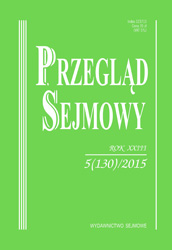Nowa ustawa o Trybunale Konstytucyjnym
A New Constitutional Tribunal Act
Author(s): Maria KrukSubject(s): Constitutional Law
Published by: Kancelaria Sejmu
Keywords: Constitutional Tribunal; Constitutional Tribunal Act; new Constitutional Tribunal Act; selection of judges of the Constitutional Tribunal; constitutional complaint
Summary/Abstract: In June of 2015, the Sejm passed a new Constitutional Tribunal Act which sums up 18 years of experience of the Tribunal that have elapsed since the modification of the model for that body (established in 1982, still under the “old regime”) implemented in the Constitution and the Constitutional Tribunal Act of 1997. The new Act does not change radically the institutional concept of the Tribunal which is based on unchanged provisions of the Constitution. As it has indeed been criticized, especially on judges’ selection by only one chamber, namely the Sejm, by an absolute, rather than a qualified (two-thirds) majority. And what, in practice, gives rise to allegations of politicization of such choice. The primary objective of the lawgiver was to modernize and streamline the proceedings, to clarify the powers of the Tribunal and the rights and obligations of parties to the proceedings, and also to implement many other rules worked out in practice. The new Act is much more extensive than its predecessor, and its scheme has been changed to be more transparent. Almost all the provisions of the old Act are modified. Some amendments introduce a new approach to procedures. An example would be the provision — aimed at increasing the efficiency of adjudication — which guarantees equal treatment of public hearings (with the participation of the parties) and in camera or closed hearings, which is subject to some criticism from the author of the article. The provisions concerning the status of judges, the adjudication procedures, the powers and obligations of the parties, and many others, have significantly been enhanced. The weakness of the Act — in the author’s view — is the absence of socialization of the process of appointing judges (by way of “primary elections” available for different lawyers organizations) which was proposed in the bill, as well as the abandonment of attempts to define the Tribunal as a specific segment of the judiciary, which could have positive impact on the specificity of its actions as a “court of law” and not a “court of facts”.
Journal: Przegląd Sejmowy
- Issue Year: 2015
- Issue No: 5
- Page Range: 9-28
- Page Count: 20
- Language: Polish

